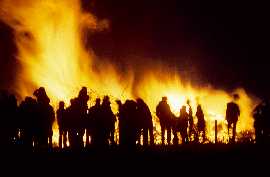Biikebrennen (von friesisch: Biike; Bake) ist ein tradionelles Volksfest im schleswig-holsteinischen Kreis Nordfriesland, das am 21. Februar (Sankt Peter) gefeiert wird (Erklärung entnommen von http://de.wikipedia.org/wiki/Biikebrennen)
Jedes Dorf und die meisten Gehöfte haben ihre eigenen Leuchtfeuer, die Mittelpunkt von feierlichen Aktivitäten wie Gesang oder Schauspiel sind. Auf den Inseln Föhr, Amrum und Sylt sind zusätzlich verschiedene Traditionen wie das Vernichten der Feuer von Nachbardörfern entstanden. Bis ins 19. Jahrhundert wurde es auch auf dem Festland gefeiert, ist dann aber vergessen worden, und wurde nach dem zweiten Weltkrieg wieder zu Ehren gebracht.
Der Ursprung des Festes ist unklar. Am wahrscheinlichsten ist aber, dass das Fest das kommende Frühjahr begrüßen soll. In manchen Dörfern wird eine Strohpuppe, die den Winter symbolisiert, verbrannt. Es wird auch vermutet, dass die Leuchtfeuer einen Leuchtturm darstellen sollen. Aber vielleicht entstanden sie auch aus den primitiven Lichtbaken an den Stränden, die im 17. und 18. Jahrhundert den Seefahrern und Walfängern als Navigationshilfe dientenThe Biikebrennen (in German), Biikebrånen (in North Frisian) or Pers Awten (in Danish) is an annual celebration held on 21 February in North Frisia, in the German state of Schleswig-Holstein and in Southern Jutland.
At Biikebrennen, nearly all North Frisian towns, and many isolated farmhouses as well, light their own bonfires, the biike, at or shortly after sunset. In many places, additional traditions have developed over time. On the islands Feer/Föhr, Oomram/Amrum and Söl/Sylt, it is a sport for the island youth to try to take down the biikes of neighbouring villages before it is lit. In some mainland villages, theatre, cabaret and dance have come into tradition.
The origin of Biikebrennen is unclear. The observation that in some places a strawman symbolising the winter is burnt, is likely to lead one to the conclusion that the celebration dates back to a pre-Christian midwinterfeast or lightfest. A connection with the medieval habit of ‚waking up the earth‘ with torches lies at hand.
An often-heard alternative account for the origin of Biikebrennen is related to the festivity’s name. As the Frisian word biike means beacon, the bonfires may well have derived from light beacons set out for North Frisian whale catchers during the 17th and 18th centuries.
On the North Frisian isles Biikebrennen has a century-long tradition. On the mainland the tradition faded away in the early 20th century, but was restored after the Second World War.
